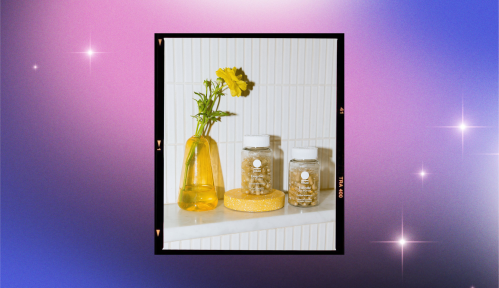Our editors independently select these products. Making a purchase through our links may earn Well+Good a commission
At Well+Good, we’ve interviewed many psychologists, therapists, and social workers over the last year, and the information they’ve offered up has been enlightening. From their well-thought advice to useful tips and tools, these experts provided insight that almost felt like free therapy. We didn’t want to just save this intel for our own benefit, which is why curated a list of our favorite therapist insights that you might have otherwise missed, or didn’t previously know about.
Experts in This Article
integrative medicine specialist
relationship psychotherapist and owner of Evolve Counseling
clinical psychologist, author of “How To Be Yourself: Quiet Your Inner Critic and Rise Above Social Anxiety”
licensed clinical social worker and recovery specialist
certified meditation teacher, writer, and integrative therapist based in the Bay Area
licensed social worker, mental health educator, and relationship expert at eharmony
Nedra Glover Tawwab, MSW, LSCW, is a therapist and the founder of Kaleidoscope Counseling. She is a relationship expert for the dating site Eharmony.
licensed marriage and family therapist
psychotherapist and assistant clinical director at Kip Therapy
clinical psychologist and co-host of the Mind In View podcast
With 2022 coming to a swift end and the new year looming over the horizon, this liminal in-between provides an opportunity for introspection and intention-setting. And if you’re resolving to make your mental well-being a top priority, we hope this list of the 10 secret therapy lessons we learned will usher you into 2023 with a deeper understanding of yourself and those around you.
1. You can be empathetic without compromising your boundaries
Being an empathetic person can mean that you’re the first person to lend a loved one a listening ear, or frequently find yourself on the receiving end of an “emotional dumping.” While you might be naturally inclined to support loved ones who are struggling, practicing empathy can become burdensome without healthy boundaries. “If friends and family routinely come to you because ‘you’re such a great listener,’ you may take on a disproportionate burden of pain. And over time, you can feel resentful and ineffective as a result,” Ellen Hendriksen, PhD, previously told Well+Good.
When you don’t have the bandwidth to show up for others, it’s okay to say no (or take a raincheck for a later date) and take time to yourself—both you and your relationship will be better for it. “Healthy boundary-setting can allow for much-needed mental and emotional rejuvenation,” licensed clinical psychologist and Joy From Fear author Carla Marie Manly, PhD, previously told Well+Good. “And when you feel replenished and rejuvenated, you’ll even be more capable of holding appropriate, loving space for the people in your life.”
2. Overcoming indecisiveness starts with realizing that not everyone will agree with you
If you struggle with making decisions both big and small, it may be due to self-distrust or the fear of how people might react to your decision, Meg Josephson, ASW, an associate therapist at The San Francisco Center for Compassion-Focused Therapies, previously told Well+Good. While it may seem counterintuitive, one of the best ways to overcome indecision is to accept the fact that not everyone will agree with you. That way, you can rely on your own instincts and learn to trust yourself. It’ll take practice to get comfortable with this idea, but once you’re over the hump, Josephson promised that it’ll be liberating.
3. You’re allowed to forgive when you’re ready
Many people are often told to forgive and forget, but to accept an apology when you aren’t ready (which therapist Nedra Tawwab, MSW, LCSW, termed as “toxic forgiveness”) can be largely unproductive. She says it’s better to forgive when you’re done processing what happened so you can move forward without carrying resentment. “If we truly do forget, then we’re still trying to be in a relationship with a version of this person that never did any harm—and that’s not the person with whom we’re really staying in a relationship,” Peter Schmitt, LMHC, a psychotherapist and assistant clinical director at Kip Therapy, previously told Well+Good. It’s also easy to fall into the trap of toxic forgiveness when you feel pressured to offer up an apology too soon.
Just as toxic forgiveness is harmful to your well-being, so is holding onto resentment. If you want to truly heal from a wrong, it begins by giving yourself the space you need from the person who hurt you and some introspection. Ask yourself how you actually feel, what inner hurts might’ve been brought up, and what forgiveness looks like for you, so you can move past the wrongdoing with peace.
4. Remembering who your people are can reinvigorate your connection to others
Even with all the opportunities to connect with others, it’s still possible to feel lonely. When that happens, it can be helpful to remember who your people are by way of an ecomap. “An ecomap is a tool used to create a visual representation of your social supports, connections, and primary relationships, as well as to identify the strengths and areas of need for each of these connections,” relationship psychotherapist Elizabeth Fedrick, PhD, LPC, previously told Well+Good. Creating an ecomap is also a way to assess if there are relationships you’ve let fall to the wayside, or whether you’re missing allies in certain aspects of your life.
Making an ecomap is pretty easy, too. Draw a circle on a piece of paper and write your name in the middle of the circle, and then, draw smaller circles that represent the social connection you have and customize each circle to visually identify your relationship with every person on your ecomap. “Once you complete as much as you can on the map, you will then use it to analyze ways to make better use of the supports available, create a ‘toolbox’ of available supports, identify ways to set boundaries where needed, determine if additional supports are needed, and so on,” Dr. Fedrick said.
5. When you’re worked up, stop and ‘HALT’
It’s easy to act on your emotions or impulses when you’re upset or worked up. Pausing with the HALT method (an acronym for hungry, angry, lonely, and tired) can be a great way to identify the root of these emotions. “[It] comes from the recovery community, however it can be applied to many scenarios beyond addiction,” Kassondra Glenn, LMSW, a social worker and addiction specialist at Diamond Rehab, previously told Well+Good. “At its core, it is a mindfulness technique that promotes greater emotion regulation by building awareness around the root of urges.”
If, for example, you’re hungry, you might want to have something to eat, or if you’re lonely, reach out to a trusted friend and talk things out or take a walk outside to feel more connected to yourself and the world around you. Whatever it is you’re feeling at the moment, the HALT method can help. “The purpose of the HALT tool is to help us feel better when we are not feeling great emotionally, and it’s often used when we’re feeling upset or emotionally off-centered,” said physician and integrative medicine specialist Catherine Uram, MD.
6. It’s okay to be selfish in your relationships—in fact, it can *improve* them
Selfishness often has a negative connotation, especially when it comes to our relationships with loved ones. However, psychotherapist and social worker Lia Avellino, LCSW, argues that there’s such a thing as positive selfishness—and it can improve relationships. “When we deprioritize selfishness—and by proxy our feelings, beliefs, and ideas—in order to be accommodating, we actually pose a threat to genuine connection rather than fuel it,” Avellino wrote for Well+Good earlier this year. If you feel a growing sense of resentment towards your partner, Avellino wrote it could be a telltale sign that you could invite a little more selfishness into your life.
To start, Avellino said it can be helpful to revisit your relationship needs to determine which of them you can take into your own hands. You might also want to identify your relationship tendencies. If you often pursue closeness with your partner, consider challenging that energy for self-care. And don’t be afraid to prioritize space (boundaries are important here) for yourself.
7. ‘Containing’ your anxiety can be a helpful way to cope with it
When anxiety takes hold, it can easily drive you into negative or catastrophic thinking patterns. If you often take a backseat to your anxiety, therapist Nina Firooz, LMFT, recommends the “container exercise.” It’s a visualization tool that she often uses with her own clients, and she told Well+Good it can especially come in handy for those who have reached their “window of tolerance” (i.e. their threshold of anxiety) and can no longer make logical decisions because of it. This exercise allows you to revisit your stressors when you’re in a calmer state.
To try the container exercise, begin by asking yourself what exactly is giving you stress, and then visualize a container that is big enough to hold all of your stress. You can also use an actual container (or whatever you have at home) and write down your stressors on paper. Once you’ve completed this step, set it aside but be sure not to forget it. Schedule time to revisit your feelings in the container. You might realize that some things that cause stress may not seem as daunting.
8. We can be our own gaslighters
Usually, gaslighting involves someone else manipulating your reality, but sometimes we gaslight ourselves. According to Avellino: “Self-gaslighting happens as a result of internalized doubt and a critical external voice so far-reaching that you begin to question your own reality and dismiss your emotions.” Self-gaslighting can stem from a person who held power over you, like a caregiver or an authority figure, or even societal sources (aka “collective gaslighting”), that you might have internalized. To help reclaim your inner voice, Avellino wrote that it’s often a matter of building your self-trust back up again.
9. There’s a difference between healthy and rigid boundaries
We’ll always advocate for healthy boundaries, but what happens when boundaries become walls that stand in the way of connection? Apparently, there’s such a thing as “rigid boundaries,” therapist and mental health educator Minaa B., LMSW, previously told Well+Good. Common signs of rigid boundaries can include isolating oneself, avoiding all conflict, and creating strict rules for relationships. “When we create rigid boundaries, we are ultimately hurting our relationships and disconnecting ourselves from our communities,” Minaa said. “All relationships are nuanced, but when we choose to see things through the simplistic lens of good versus bad, we fail to create space for that nuance in our lives.”
To avoid setting boundaries that are too strict, Minaa said that first, it’s important to avoid taking things too personally, and in the event of a conflict, to listen— and if you are in the wrong, to own up to it. She said it’s also important to reflect on a particular situation, and to ask yourself whether a boundary allows room for connection, and just as importantly, whether you want to more deeply connect with another individual or distance yourself from them.
10. Hard as it is to admit, *we* can sometimes be the passive-aggressive ones
It’s easy to notice passive-aggressive behavior as we see it, but it becomes more challenging to spot when it’s coming from us. “There’s a strong motivation to actively ignore the reality of the aggressive or angry feelings,” associate clinical director at Kip Therapy and psychotherapist Peter Schmitt, LMHC, previously told Well+Good. When people ignore and suppress their hurt, it can be harder to recognize when we act out of our feelings—which can, in some instances, look like passive-aggressiveness.
There are certain tells—like saying things we don’t mean or relying on sarcasm to communicate—that might point to passive-aggressiveness. To overcome this behavior, it’s important to acknowledge that it could be playing a role in your interactions, then do daily check-ins with yourself to see where it might be coming from. Use “feeling” words (Are you Anxious? Upset? Angry?) to identify these emotions and understand that they don’t make you a bad person—it’s normal to have them. Once you recognize them, it’s also important to know that they are worth addressing in conversation.
Sign Up for Our Daily Newsletter
Get all the latest in wellness, trends, food, fitness, beauty, and more delivered right to your inbox.
Got it, you've been added to our email list.











